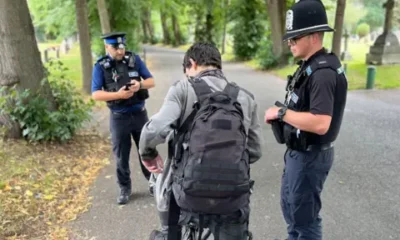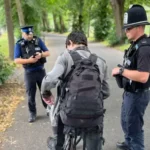Business
Drone attacks leave Denmark exposed – and searching for response
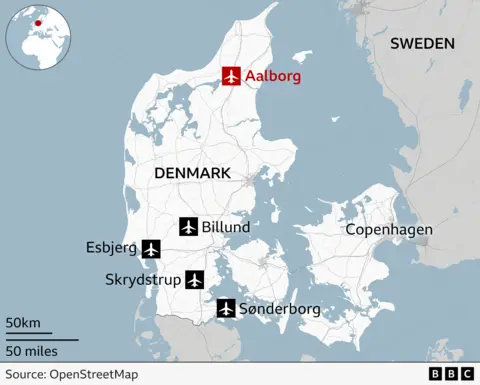
Read full article on post.
Paul KirbyEurope digital editor
 BO AMSTRUP/Ritzau Scanpix/AFP
BO AMSTRUP/Ritzau Scanpix/AFPA night of drone incidents at airports and military bases all over Jutland, western Denmark, has not caused any harm or damage – and yet it has exposed the country’s defences as vulnerable to attack.
In an era of hybrid warfare, there is a sense of embarrassment in Denmark – a founding member of the North Atlantic Treaty Organization (Nato) alliance – that its critical infrastructure has become so vulnerable.
Aalborg and Billund airports had to close, while drones were spotted at Esbjerg, Sonderborg and Skrydstrup. Aalborg also serves as a military base and Skrydstrup is home to some of the air force’s F-35 and F-16 war planes. Drones were also seen over the Jutland Dragoon regiment at Holstebro.
There have since been reports of police investigating drone activities around Denmark’s oil and gas platforms in the North Sea, and near the central port of Korsor.
The question now facing the country’s military is how to respond.
None of the drones have been shot down – defence chiefs decided it was safer not to, but that is not a long-term solution.
Denmark is, of course, not alone.
Norway, Estonia, Poland, Bulgaria and Romania have all been subjected to hybrid warfare in recent weeks. All are on Nato’s eastern flank.
Estonia and Poland have both invoked Nato’s Article 4 this month after Russian war planes entered Estonian air space for 12 minutes, and about 20 Russian drones violated Polish airspace and were shot down.
Denmark has said a “professional actor” was responsible for the drone attacks it saw, but that there was no evidence of Russian involvement.
Article 4 brings the defensive alliance together for consultation when a member’s “territorial integrity, political independence or security… is threatened”.
The Danish government is currently assessing whether to invoke it too.
This is a serious moment for Denmark, and its top brass – government, defence and police – quickly called a press conference where Defence Minister Troels Lund Poulsen said it looked “systematic”, because of the number of locations targeted.
“This is what I would define as a hybrid attack,” he said, without attributing blame as they have no concrete evidence.
Russia has not been ruled out – something Prime Minister Mette Frederiksen made clear after Monday night’s drone disruption over Copenhagen.
Moscow “firmly rejects” any involvement and its embassy in Copenhagen has denounced the incidents as “staged provocation”.
However, Frederiksen is in no doubt about the risk and said only last week that Russia “will be a threat to Europe and Denmark for years to come”.
Nobody has yet come to any harm, primarily because the drones were left to fly their course.
Defence chief Michael Hyldgaard put it simply: “When you shoot something down in the air, something also comes down again.”
An example of that was when the roof of a house was destroyed in Wyryki, eastern Poland, reportedly by a missile fired by a Nato jet.
Police in Jutland did say they would try to bring down the drones if it could be done safely, and the military has made clear it is prepared to do so over military installations, dependent on “the specific threat assessment and possible consequences of the takedown”.
But it has not happened so far.
Kjeld Jensen, from the drone centre at the University of South Denmark, accepts it is embarrassing that Denmark’s vulnerabilities have been laid bare – but he believes the police and military acted appropriately.
“I wouldn’t shoot down the drones if they are over an urban area or an airport,” he says, “as they have to come down, and there’d be other fuel or batteries creating a fire, which is also a risk you have to take into account.”
“You need to decide whether it’s more dangerous than letting it fly around,” says Peter Viggo Jakobsen, of the Royal Danish Defence College. “But it’s not a sustainable situation and we need to come up with ideas.”
Denmark’s cautious approach is markedly different from Poland’s since Russia’s drone incursions there on 10 September.
This week, Polish Foreign Minister Radek Sikorski warned Moscow at the UN: “If another missile or plane crosses our territory without permission, intentionally or by accident, and is shot down and its wreckage falls on Nato territory, do not come here to complain. You have been warned.”
What Denmark and many of its neighbours lack is the kind of tools they need to bring down the drones.
The government recently announced plans for an “integrated layered air defence”, along with investment in long-range precision weapons to hit enemy territory.
But that’s of little use for Denmark’s defences right now.
“From an engineering perspective it’s so much easier to build a drone that can fly than to build something that can keep them from flying,” Jensen, from the University of South Denmark, points out.
On Friday, Denmark will join several Nato allies and Ukraine to discuss the idea of erecting a “drone wall”, proposed by European Commission President Ursula von der Leyen, to protect the EU’s eastern borders.
The drones they will be discussing are more likely to focus on the kind of armed weapons that reached Polish airspace rather than the unarmed drones with bright lights seen over Denmark.
The aim is to create an early detection system, although again that may not have helped Denmark overnight if drones spotted over Jutland were launched locally.
If Russia was behind the latest drone disruption, despite its denials, then by the standards of hybrid warfare this operation appears to have been a success.
Airports were briefly closed, Denmark’s military sites were made to look vulnerable, and senior ministers were forced to give a rushed press conference to allay public concerns.
But it has given Danes a new wake-up call. Police have raised their crisis level and the defence minister has spoken of the country facing a new reality.
Business
Jaguar Land Rover restarts some IT systems after cyber-attack
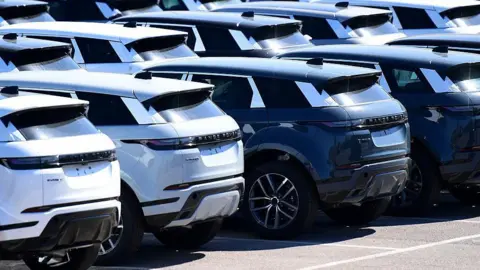
Read full article on post.
Michael RaceBusiness reporter,
Elizabeth GlinkaPolitical editor, BBC Midlands and
Theo LeggettInternational business correspondent
Jaguar Land Rover (JLR) says it has begun a “phased restart” of its operations with parts of its IT system back up and running.
The company said it was “working to clear a backlog of payments” to suppliers as it now had increased its processing capacity for invoicing.
The carmaker’s production lines have been suspended since a cyber-attack in August forced the company to shut down its IT networks. Its factories remain closed until next month at the earliest.
The prime minister said the government was “working 24/7” on a support package for suppliers amid growing concerns that some, mostly small businesses, could go bust due to the prolonged shutdown of operations.
Sir Keir Starmer said the situation faced by suppliers was “urgent”, but admitted no support plan had yet been finalised.
“I am acutely aware of the urgency of the situation and the difficulties that many of these companies are inevitably finding themselves, through no fault of course of their own,” he told the BBC.
Various ideas have been put forward over how the government could step in to support suppliers of JLR until car production is restarted.
The company said on Thursday that its recovery programme was “firmly under way” and that its global parts logistics centre, which supplies spare parts that service customers’ vehicles, “returning to full operations”.
“The financial system we use to process the wholesales of vehicles has been brought back online and we are able to sell and register vehicles for our clients faster, delivering important cash flow,” the company added.
The carmaker said it recognised that the situation was a “difficult time for all connected with JLR”, with no new cars being built and staff being sent home from work.
The manufacturer, which is owned by India’s Tata Motors, typically builds about 1,000 cars a day at its three factories in Solihull and Wolverhampton in West Midlands, and Halewood in Merseyside.
Workers have been told to stay home since 1 September, with no firm return date.
About 30,000 people are directly employed at the company’s plants with about 100,000 working for firms in the supply chain. Some of these firms supply parts exclusively to JLR, while others sell components to other carmakers as well.
Calls have been made to support suppliers, whose businesses are under threat as a result of the knock-on impact of the cyber attack.
One idea being explored is the government buying the component parts the suppliers build, with the aim of keeping the companies in JLR’s supply chain in business until production lines are up and running again.
However, firms have told the BBC they are sceptical about the success of such a scheme.
The government “simply don’t understand the complexity of what they’re dealing with”, said one supplier.
“We don’t need promises, we need help.”
The prime minister said the business secretary, Peter Kyle, was “working 24/7 with those businesses to come up with a viable way of solving this and supporting them in this crucial period”.
Unions have called for a Covid-style furlough scheme, but ministers have ruled this out given its likely cost, sources have told the BBC.
While the purchase and stockpiling of car parts by the government is an option on the table, this would present considerable logistical challenges.
JLR’s manufacturing process relies on the right part arriving at the right place, at the right time.
Another option being considered is government-backed loans to suppliers, though this is understood to be unpopular with suppliers.
Business
‘Film me all you want’ – teenage girls with no fear of police torment one High Street
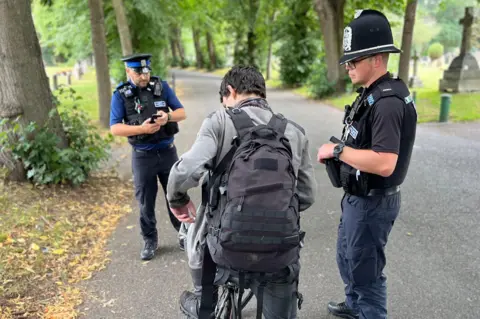
Read more on post.
Dan JohnsonBBC News and
Sophie WoodcockBBC News
 BBC
BBCThe teenager’s sense of invincibility is clear. “The police are never ever going to help you,” she says, “you can film me all you want”.
She’s refusing to leave a shop caught at the centre of a prolonged campaign of antisocial behaviour – windows smashed, items stolen, fires started, staff threatened and attacked.
Muhammad Usman, owner of the mobile phone store in Shirley, near Southampton, is filming her on his own phone – and her juvenile bravado is in full flow. “Touch me and I’ll get you done for assault,” she warns him.
“It’s getting worse, day by day,” Muhammad later tells us from behind his till. His voice cracks, clearly worn down by months of abuse – including, he says, a threat by a teenager to kill him. “I’ve never had this kind of experience in my life before. We’re feeling so helpless.”
What Muhammad and other shopkeepers have experienced over recent months captures the challenge antisocial behaviour poses to police, councils and communities at a time when the government has said tackling it is a key priority.
Three doors down, on the same High Street, Nnenna Okonkwo is also feeling under siege. “It’s ridiculous that it’s just a couple of teenagers causing this mayhem,” she says through tears.

But these don’t seem to be hooded gangsters armed with weapons.
When I eventually encounter the gang, I’m faced with a 14-year-old girl in pink leggings and Crocs.
“I’m not claiming to be innocent because I’m not,” she tells us. “I’ve threatened people and I’ve hit people, I’ll admit to that.”
“The second you get into one bit of trouble with the police, you fall into it too deep and you can’t get out,” she adds.
She says an injury forced her to give up sport and that behaving badly offers an alternative energy release. “I found that I get the same adrenaline boost from being in trouble with the police and being missing and stuff.”
But there’s little remorse. “I regret what I do, but I don’t say sorry,” she says to cheers from the rest of the gang.
She seems bright but deeply troubled. She admits drinking and she’s vaping while we talk. Muhammad had already told us he had experienced racist abuse – something the girl firmly denies being involved in.
One of her friends chimes in. “I know what we’re doing is wrong but we’re teenage kids, we’re going to have a bit of fun,” she tells us. “I’m sorry for most of the people we have damaged, but I have no sympathy… it’s just one way of taking my anger out.”
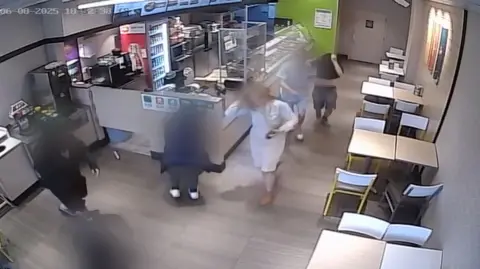
Responding to this BBC report, Prime Minister Keir Starmer said: “Let me be really clear what we’re seeing [in Southampton] is completely unacceptable. That shouldn’t be happening in any community.”
He said people committing anti-social behaviour “should be fearful that they’re going to feel the full force of the law”.
Labour was elected last year promising new “respect orders” to ban similarly persistent offenders from town centres. Due to be introduced under the Crime and Policing Bill currently going through Parliament, breaching the orders would be a criminal offence with potential penalties including a two-year prison sentence, unlimited fines, or unpaid work.
That would partially replace existing civil injunction powers. But the respect orders would not apply to under-18s. An amendment aims to bring that down to 16, but would still not apply to anyone younger.
Ministers have also promised more neighbourhood policing. In Shirley, Muhammad’s complaint is not the number of officers, but their apparent lack of power or willingness to tackle the teenagers. “You don’t see any action against them,” he says. “You feel they are above the law.”
‘We need to be more robust’
The local beat officer, PC Tom Byrne, says he recognises the concern and that antisocial behaviour is being dealt with.
“We do need to remember we are dealing with young people,” he told BBC News in July, saying that while “there will be consequences”, these need to be appropriate when it comes to children.
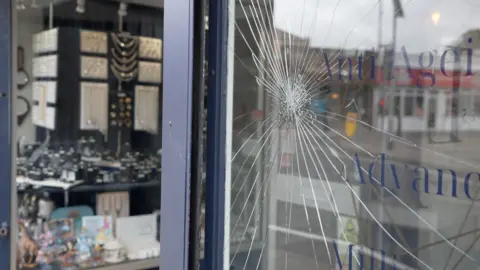
Such instincts to keep young people away from the criminal justice system are deep-rooted in policing – perhaps in the hope antisocial behaviour fizzles out. However, the problem has got worse over the long, hot summer of 2025.
Behaviour like this isn’t just happening on one High Street, and it’s not just teenagers. A few miles along the south coast in Portsmouth, Neil Gibson knows the cost of repeated antisocial behaviour. His car repair business has been hit repeatedly, he believes by the same group of young men. Security camera footage shows one hooded youth hammering a windscreen with a broom until it smashes.
Neil spends some evenings remotely checking his security cameras from home. “I did phone [the police] and say look, if you send someone now, you’ll catch them – perfect situation. I’m afraid they weren’t interested.”
Disheartened, he says he no longer reports every incident.
In nearby Fratton, a former industrial part of Portsmouth now largely residential, we see what the police are up against.
Patrolling the cemetery one evening, PC Chris Middleton attempts to stop a young man zipping down a footpath on an electric scooter – but the masked figure simply ignores the constable and speeds off.
We ask PC Middleton if he can see why some people believe the police are powerless. “Yeah, I feel it,” he says. “At times I really do feel that we need to be more robust and we need more support from the government to tackle these things.”
A short while later, a convicted shoplifter who is wanted on recall to prison walks past – he is searched and arrested.
It’s a similar story for councils, many of whom across the country are using community wardens to keep a grip on antisocial behaviour. Jason, a warden for Portsmouth City Council, tells us “a lot of police stuff is being downgraded to antisocial behaviour”, multiplying his workload.
Cllr Matt Boughton, chair of the Local Government Association’s safer and stronger communities committee, has a similar view – telling BBC News that councils “are increasingly having to step in when police resources are stretched…putting extra pressure on already stretched councils, pressure which is unsustainable”.
How can these issues in the communities we’ve visited – and many others like them across the country – really be solved, then?
‘I regret all of it’
Someone whose role involves working alongside the wider criminal justice system is Donna Jones, Hampshire’s police and crime commissioner (PCC). The former Conservative councillor feels the police need a change of approach to dealing with youths and their parents.
“I think the response from the police, to be absolutely honest with you, has been to take a slightly slower approach but some of these young people are committing some really horrible, nasty offences,” she tells us while visiting shopkeepers in Shirley. She says they are being plagued by “an urban street gang made up of quite a high number of young girls”.
“What we need to be doing is also putting the parents more on the record for some of this stuff too so perhaps some change in legislation that does make parents much more accountable.”
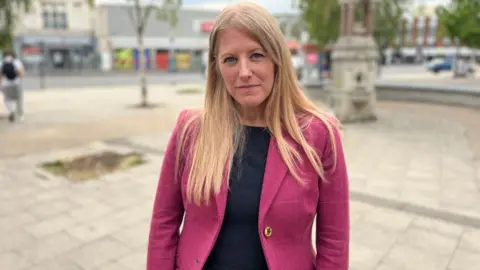
Authorities already possess a range of powers, including civil injunctions, community protection notices, dispersal orders and criminal behaviour orders – the original antisocial behaviour order (ASBO) was replaced in 2014. They can also fine parents and even remove social housing.
But not all of these are applicable to children, and using the ones which are, at scale, will end up criminalising more children. Such measures require time and evidence to obtain, straddling police and councils and concerning often vulnerable young people.
There have been arrests. A teenager has now been charged with 22 offences, including assault, theft, arson, criminal damage, breaching a dispersal order and racially aggravated harassment. The teenager appeared at Southampton Youth Court last week and is due to appear again next month.
After months of persistent antisocial behaviour, the situation in Shirley has calmed down in recent weeks.
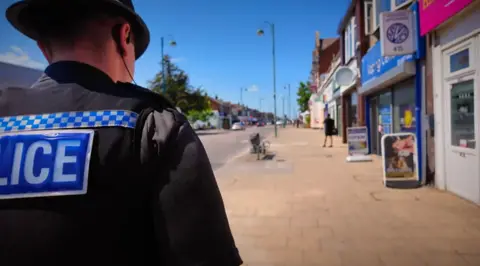
Responding to the BBC, Policing Minister Sarah Jones said “for too long, people have not seen police patrolling their streets”. She said “this government has increased police patrols in high-crime areas across the country through our Safer Streets Summer Initiative”.
Pledging 3,000 more neighbourhood police on the beat by March 2026, she said “we are sending a clear message: crime will be punished”.
And on Thursday the prime minister is due to announce measures to give communities more power to “seize boarded shops” and “block gambling and vape shops on their High Street”.
Hampshire Police told us it had “endeavoured to respond to as many reports as possible” of antisocial behaviour on Shirley High Street but “had to ensure this was balanced against the increase in emergency calls” over the summer months.
Away from the mayhem, we did find some more positive news.
As the summer draws to a close and kids return to school, Jaiden, 15, recalls the hours he spent in a police cell after being arrested. From the sofa of his home in Shirley, he tells us he was causing trouble at shops “nearly every day”.
“It was fun getting people mad but then I realised after a while it wasn’t.”
His mum Kylie says she pleaded with the police to act, having felt she’d lost her son to peer pressure. “Two or three times I asked them ‘just arrest him’. They said we can’t due to his age, we’re going to just have to bring him home. There’s not much we can do.”
He reads the list of rules he and his mum have since signed in a voluntary “acceptable behaviour contract”. They include him not stealing, making threats, or using foul or abusive language and leaving shops when ordered. If he complies, he can avoid court.
Jaiden vows to never go back to that way of life. “I regret all of it,” he says.
Correction: This story has been updated to remove a reference about an earlier court date, involving a teenager, which did not go ahead.
Business
Digital ID to be compulsory for all UK adults under government plans

This post was originally published on this site.
Paul SeddonPolitical reporter
Sir Keir Starmer is expected to announce plans for a compulsory UK-wide digital ID scheme in a speech on Friday.
The prime minister believes it would help crack down on illegal working and modernise the state, according to senior figures in government.
The practicalities of the scheme will be subject to a consultation, which will also look at how to make it work for those without a smartphone or passport.
The previous Labour government’s attempt to introduce ID cards was ultimately blocked by the Conservative-Liberal Democrat coalition.
But earlier this month, Sir Keir said in an interview he thought the debate had “moved on” since then.
“We all carry a lot more digital ID now than we did 20 years ago, and I think that psychologically, it plays a different part,” he added.
Reports have suggested the government plans to use a new scheme to check people’s right to live and work in the UK, with people’s individual ID checked against a central database.
These checks are currently based on physical documents, although routes to complete the checks online for some people have existed since 2022.
Plans for a digital ID scheme did not feature in Labour’s election manifesto last year, and the government has previously rejected a proposal for digital ID suggested by former Labour Prime Minister Sir Tony Blair.
But in recent weeks ministers have spoken with increasing enthusiasm about the idea, as they have come under increasing pressure to tackle illegal migration.
Cabinet Office minister Pat McFadden has also talked about the scheme’s potential to improve access to government services.
He recently visited Estonia, where digital identity can be used to access services such as medical records, voting and banking.
‘Cynical ploy’
Conservative leader Kemi Badenoch said introducing mandatory ID would be “very serious step that requires a proper national debate”.
She criticised the government’s announcement as a “desperate gimmick” to distract attention from the “leadership maneuverings” of Greater Manchester Mayor Andy Burnham ahead of Labour’s annual conference next week.
She has previously said that digital ID was “not really going to solve the problem” of illegal working in the UK.
Reform UK has denounced the plan as a “cynical ploy to fool voters that something is being done about illegal immigration”.
“It’s laughable that those already breaking immigration law will suddenly comply, or that digital IDs will have any impact on illegal work,” the party added.
“All it will do is impinge further on the freedoms of law-abiding Brits.”
The Liberal Democrats, who played a central role in blocking the previous Labour government’s ID cards, have said they “cannot support” a mandatory scheme.
“People shouldn’t be turned into criminals just because they can’t have a digital ID, or choose not to,” added technology spokesperson Victoria Collins.
Former Labour leader Jeremy Corbyn, who is set to launch a new left-wing party in the coming weeks, said he was opposed to a compulsory scheme, branding it an “affront to our civil liberties”.
Online checks
Employers already have to check that prospective candidates have the right to work in the UK.
Since 2022, they have been able to carry out checks on passport-holding British and Irish citizens by using digital verification services that have been certified by the government.
A Home Office online scheme also exists to verify the status of some non-British or Irish citizens, whose immigration status is held electronically.
The government has also been phasing out physical permits for foreign residents with online-only eVisas.
It is understood officials have been looking at whether requiring a digital ID could provide a more consistent approach to verifying identity.
They are also thought to be exploring whether the scheme could reduce the use of fake documents, and make it easier to target enforcement activity.
Open Rights Group, a civil liberties campaign, said the rollout of eVisas had been subject to data errors and systems failures.
It added that the government’s proposals risked creating a “pre-crime state where we constantly have to prove who we are as we go about our daily lives.”
-
Culture2 days ago
Taylor Swift’s new cinema outing generates more than €12million in just 24 hours
-
Politics2 days ago
European Parliament snubs Orbán with vote to shield Italian MEP from Hungarian arrest
-
Culture2 weeks ago
Life, loss, fame & family – the IFI Documentary Festival in focus
-
Health3 days ago
EU renews support for WHO’s Universal Health Coverage Partnership
-
Culture2 months ago
Fatal, flashy and indecent – the movies of Adrian Lyne revisited
-
Culture2 days ago
Twilight at 20: the many afterlives of Stephenie Meyer’s vampires
-
Environment6 days ago
Key oceans treaty crosses threshold to come into force
-
Culture1 week ago
Farewell, Sundance – how Robert Redford changed cinema forever







